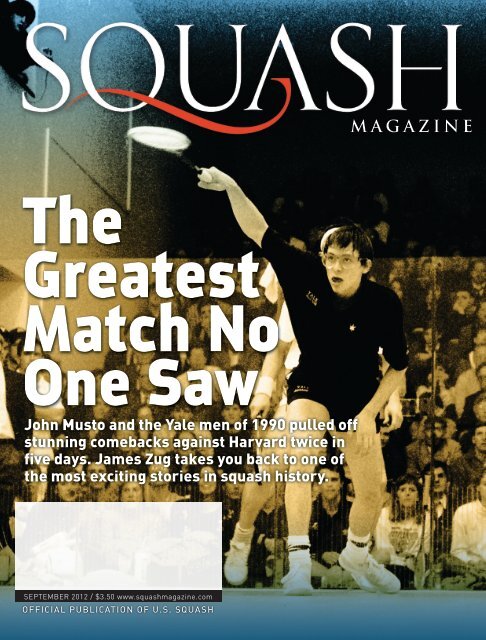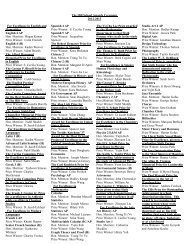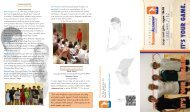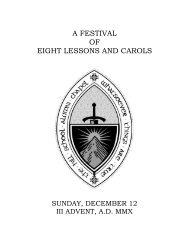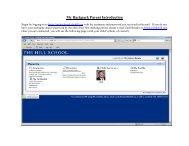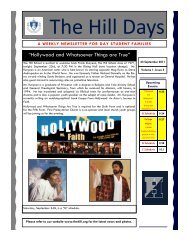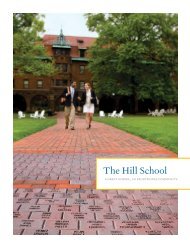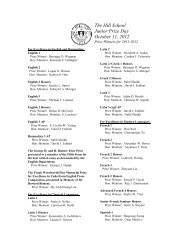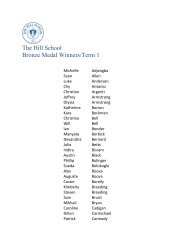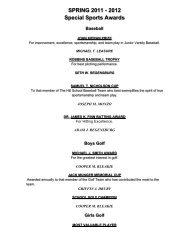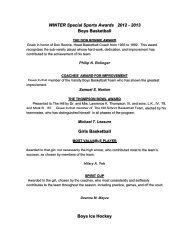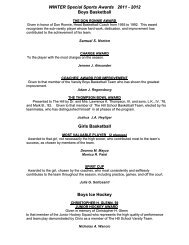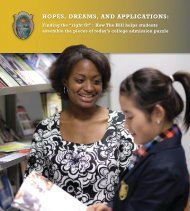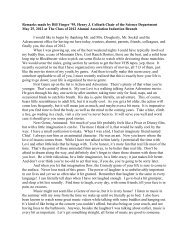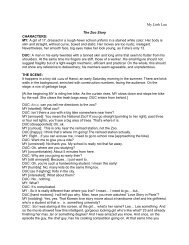feature article - The Hill School
feature article - The Hill School
feature article - The Hill School
Create successful ePaper yourself
Turn your PDF publications into a flip-book with our unique Google optimized e-Paper software.
M A G A Z I N E<br />
<strong>The</strong><br />
Greatest<br />
Match No<br />
One Saw<br />
John Musto and the Yale men of 1990 pulled off<br />
stunning comebacks against Harvard twice in<br />
five days. James Zug takes you back to one of<br />
the most exciting stories in squash history.<br />
SEPTEMBER 2012 / $3.50 www.squashmagazine.com<br />
OFFICIAL PUBLICATION OF U.S. Squash
HeBy James Zug<br />
Whiffed:<br />
Yale v. Harvard<br />
Wednesday 21 February 1990<br />
Payne Whitney Gymnasium, Yale University, New Haven<br />
Yale Harvard Winner Score<br />
1. John Musto ’91 v. Mark Baker ’92 Y 3-2<br />
2. Cyrus Mehta ’90 v. Jeremy Fraiberg ’92 Y 3-1<br />
3. Tim Goodale ’91 v. Jon Bernheimer ’90 H 3-0<br />
4. Alex Dean ’90 v. Jonny Kaye ’92 H 3-0<br />
5. Garrett Frank ’92 v. Jim Masland ’90 Y 3-1<br />
6. Chris Hunt ’90 v. Marty Clark ’93 H 3-2<br />
7. Jeff Hoerle ’90 v. Farokh Pandole ’92 H 3-0<br />
8. Tuffy Kingsbury ’90 v. Jon Masland ’91 Y 3-1<br />
9. Alex Darrow ’91 v. Josh Horwitz ’93 Y 3-2<br />
22 | SEPTEMBER 2012
<strong>The</strong> Original Streak, the Cardiac<br />
Kid, <strong>The</strong> Palindromic String and<br />
Cool as a Cucumber—<strong>The</strong><br />
Story of the Greatest Squash<br />
Match That No One Saw<br />
Yale v. Harvard<br />
Sunday 25 February 1990<br />
Thomas B. Ringe Squash Courts, University of Pennsylvania, Philadelphia<br />
Yale Harvard Winner Score<br />
1. John Musto ’91 v. Mark Baker ’92 Y 3-2<br />
2. Cyrus Mehta ’90 v. Jeremy Fraiberg ’92 H 3-0<br />
3. Tim Goodale ’91 v. Jon Bernheimer ’90 H 3-0<br />
4. Alex Dean ’90 v. Jonny Kaye ’92 Y 3-0<br />
5. Garret Frank ’92 v. Jim Masland ’90 Y 3-2<br />
6. Chris Hunt ’90 v. Marty Clark ’93 H 3-0<br />
7. Jeff Hoerle ’90 v. Farokh Pandole ’92 Y 3-1<br />
8. Tuffy Kingsbury ’90 v. Jon Masland ’91 H 3-2<br />
9. Alex Darrow ’91 v. Josh Horwitz ’93 Y 3-2<br />
squash magazine | 23
1989<br />
We had lost to Harvard in the regular season in 1989, 6-3 in<br />
Cambridge. A week later we beat them in the semis of the first<br />
nationals team tournament at Yale. We beat them 7-2. And then<br />
we beat Princeton in the finals. It was theoretically an historic<br />
victory, but we really didn’t celebrate because if anything it reinforced<br />
that we should have beaten Harvard in the regular season<br />
match which was just a few days before.<br />
Some people were happy, but I very specifically remember<br />
many people including myself who were very unsatisfied by the<br />
outcome of the season. That season we were considered the sole<br />
national champions for both regular season and the team tournament,<br />
but we were tied for the Ivy title. This is because the Ivy<br />
League did not use a tie-breaker but the CSA did. I think it was<br />
1961 when Yale had last beaten Harvard. <strong>The</strong> difference in the<br />
celebration between the tournament win in 1989 and the regular<br />
season win the next year was a factor of about 100.<br />
—John Musto<br />
1989 was Dave Fish’s last home match at Harvard. It was a<br />
beautiful send-off.<br />
—Steve Piltch, Harvard men’s coach<br />
1989 was the first year of the national teams for the men.<br />
<strong>The</strong>re was some pushback from the athletic department to create<br />
it because it did add an extra match day. But it made sense.<br />
<strong>The</strong> women had started their team tournament years before<br />
[1973] but the men, we had never had one.<br />
Before 1989 it was simply an individual men’s tournament.<br />
So even though we won this new tournament, we were not convinced<br />
we were really the national champions. <strong>The</strong>re was some<br />
confusion about that in the beginning. Everything was new and<br />
the regular season had always been the sole way of determining<br />
that. OK—so we had beaten Harvard in some playoff tournament.<br />
It wasn’t enough. We hadn’t beaten them in the regular season<br />
since 1961. That was <strong>The</strong> Streak in those days. And in 1989 it<br />
reached 28 straight wins. Did the playoff win end <strong>The</strong> Streak? We<br />
didn’t feel so. Maybe we were national champions, but we still<br />
had something to prove.<br />
—Dave Talbott, Yale men’s coach<br />
<strong>The</strong> [1962] Intercollegiate team contest was a tight, threeway<br />
affair, but both Harvard and Yale succeeded in defeating a<br />
good Princeton team, so it came down to the last team match,<br />
even as it had in 1961 when Yale defeated Harvard 5-4 in a thriller.<br />
This one was so close that it was hard to believe. Played at<br />
Yale before a packed and cheering gallery, the match see-sawed<br />
24 | SEPTEMBER 2012
ack and forth until with the matches tied at 4-all, Yale’s [Joe]<br />
Holmes and Harvard’s [John] Francis entered the fifth and deciding<br />
game. <strong>The</strong> Yale fans were overjoyed when Holmes vaulted to<br />
a 11-6 lead. However sophomore Francis rose magnificently to<br />
the occasion and with a blazing hard serve and a series of nick<br />
drop shots incredibly won the next nine points for the match and<br />
the title. <strong>The</strong> small but vocal group of Harvard fans jumped into<br />
the court to congratulate their hero.<br />
—USSRA 1962-63 Yearbook<br />
<strong>The</strong> Elis’ bus ride home didn’t begin until after midnight.<br />
Make no mistake; it was a grim trip and even the silver linings<br />
were tarnished. <strong>The</strong> JV had swept: Yale won numbers 11-20 in a<br />
breeze. Like the 747 that lost to a Saab, they picked the wrong<br />
distance…Unlike other years, though—and here the previous 27<br />
come to mind—1989 offered the hope of revenge. <strong>The</strong> coming<br />
weekend would be the new nine-man team intercollegiate tournament,<br />
held at the comfortable confines of Payne Whitney Gym.<br />
And revenge Yale would get, in the form of a 7-2 semifinal win.<br />
But as far as the streak was concerned, they might as well have<br />
been playing foosball.”<br />
—Derrick Niederman, Squash News, April 1989<br />
I’ll never forget that feeling coming back from Cambridge in<br />
1989 in the van. We didn’t want that feeling again.<br />
—Chris Hunt<br />
That was a super-depressing bus ride back in ’89. <strong>The</strong> worst<br />
couple of hours of my life.<br />
—Tuffy Kingsbury<br />
THE TEAMS<br />
You’ve got a coach in Dave Talbott who created a situation<br />
where you could be your best. Growing up in Denver, I had not<br />
been a part of the East Coast scene. As a freshman I played from<br />
No. 12 to No. 16 but Dave didn’t give up on me.<br />
—Chris Hunt<br />
So many of us had fathers who had gone to Yale: Garrett,<br />
Alex, Tommy Clayton, my father. Yale was in our blood and the<br />
streak was killing us.<br />
—Tuffy Kingsbury<br />
(Opposite) <strong>The</strong> 1990 national champions from Yale<br />
University: (Back row, L-R) Dave Talbott (Head Coach),<br />
Alex Dean, Charlie Stewart, Alex Darrow, Scott Faber,<br />
Tim Goodale, Tim Levin, Kenny Katz, Jim Seldner;<br />
(Middle row) Gerard Griffin, Jeff Hoerle, Chris Hunt,<br />
Cyrus Mehta, Tuffy Kingsbury, Bill Bauman, Garret<br />
Frank; (Front row) John Musto, Dan Morgan, John<br />
Schumann, Jeremy Feinstein, Genry Morsmann. <strong>The</strong><br />
other key off-court part of the Yale team was Henry<br />
“Sam” Chauncey, Jr., (above, with Scott Faber).<br />
Chauncey, class of 1957, was a longtime senior<br />
administrator and still today is a central behind-thescenes<br />
part of the Yale Squash program.<br />
squash magazine | 25
I grew up in New Haven. My dad was a Yale professor. I started<br />
going to Yale v. Harvard matches from age 12 and Harvard<br />
would always win 9-0. I idolized the Yale squash players. It would<br />
crush me to see them lose.<br />
—John Musto<br />
We were a very tight team. A lot of us (me, Goodale, Tuffy,<br />
Musto) lived in Davenport [College]. A lot of us were from the<br />
Heights Casino program. A lot of us were members of Sigma Nu<br />
fraternity. We hung out together all the time. We were buddies.<br />
We had fun together. A lot of the top teams weren’t like that. We<br />
had a free spirit as a coach. It was a different era.<br />
—Alex Dean<br />
1989-90 was my first year as men’s coach. I had been the women’s<br />
coach for three years and when Dave Fish stepped down<br />
from the men’s squash team, I<br />
came in. 1989 was a tough season. Princeton had ended our six<br />
year, 72-match win streak and then we had lost to Yale in the nationals.<br />
Fishy was an institution. He was an extraordinary friend and<br />
mentor.<br />
Looking at the 1990 season, it was a huge transition. I thought<br />
we had a lot of ability, we had a good team. Ultimately, Princeton<br />
and Yale would push us. <strong>The</strong> truth was going to play out in the<br />
course of the year.<br />
We had serious talent: Marty Clark got to 59 in the world; Jeremy<br />
Fraiberg got to 99. Bernheimer played on the pro tour for three<br />
years. This was a good team. We had guys from four countries: Baker<br />
from England, Pandole from India, Kaye from Israel and Fraiberg<br />
from Canada. We had two fantastic American recruits, Josh Horwitz<br />
and Clark—they were the top two American juniors—to help replace<br />
George Polsky who was away that year, but our<br />
big recruit was Mark Baker. He transferred in<br />
as a sophomore from England. Physically he<br />
was an incredible player—strong as an ox,<br />
built like a house. Jon who had played No. 1<br />
last year and Jeremy, they had to step down<br />
a notch as Baker turned out to be a fantastic<br />
hardball player.<br />
—Steve Piltch<br />
I had been the U19 English captain<br />
and was probably in the top ten of juniors<br />
worldwide. I had been accepted at<br />
Harvard as a freshman but I decided to<br />
go to Nottingham University in England.<br />
<strong>The</strong>n I decided to re-interview and was<br />
accepted as a sophomore. <strong>The</strong> team<br />
were a good bunch of guys, so it was not<br />
hard to integrate, and the transition to<br />
hardball was relatively easy and I was<br />
beating most players straight away. I<br />
played two tournaments that season,<br />
one local tournament [Boston Eye<br />
Opener] where I lost to Greg Zaff in<br />
the final and the Harry Cowles tournament,<br />
which I won.<br />
—Mark Baker<br />
We were psyched to have Mark.<br />
He was really fit and had these<br />
strong, enormous legs—a very powerful<br />
player. He picked up hardball<br />
really quickly.<br />
—Jon Bernheimer<br />
I had met Mark at the World<br />
Juniors in Scotland in 1988 when<br />
I was on the Canadian team and<br />
we talked about Harvard—I had<br />
deferred for a year after high<br />
school—and so I was psyched<br />
when he finally came.<br />
—Jeremy Fraiberg<br />
26 | SEPTEMBER 2012
<strong>The</strong> junior varsity celebrates—Jeremy<br />
Feinstein, with the thumbs up, and New<br />
Haven native, Charlie Stewart.<br />
We had a lot of talent there, with Jeremy and Mark, a lot of guys<br />
from overseas. Steve brought us together. Piltchy was a fantastic<br />
coach. He had the right balance between working hard and having<br />
fun. Amazing guy. I thought the transition from Dave to Steve was<br />
seamless. Piltchy was already there, so it was fluid. Dave was still<br />
around, he didn’t completely leave the scene. He’d give technical<br />
advice. Steve was amazing about the physical aspects of the game.<br />
We were a pretty close-knit team. We hung out together<br />
and had a good team dynamic. We worked hard. I would get them<br />
up at 6am and go running at the indoor track. A lot of guys weren’t<br />
really into that. I was a kind of maniac. Gary Waite was on campus<br />
then, and he’d come to practice. I just loved that. We’d pick his brain<br />
and talk about how to be a better player. He’d come on court and<br />
just kick the crap out of us.<br />
—Jon Bernheimer<br />
I remember being totally unprepared for college squash.<br />
I was the No. 2 ranked junior in the country and I showed up<br />
to practice and was overwhelmed. I was getting my ass kicked.<br />
Practices were intense. It was very humbling. I lost a lot. It was<br />
a learning experience. I wasn’t going to play top five. I was No. 9.<br />
Tuesdays and Thursdays we ran sprints on the track in the<br />
morning. Twelve 440s. Guys were throwing up. It was the worst<br />
experience of my life.<br />
We had some good times together. We used to talk on the<br />
long van rides and Fraiberg would come up with some crazy hypothetical:<br />
“What if Bo Jackson played tennis, how long would<br />
it take him to win Wimbledon? If Michael Jordan played hockey,<br />
how long would it take him to score fifty goals? If Pete Sampras<br />
played golf…” Farokh and Jonny Kaye used to goad Jeremy. That<br />
game passed the time in the van.<br />
—Josh Horwitz<br />
Steve was more a disciplinarian than Fish. He was a very<br />
good coach.<br />
We all got along. <strong>The</strong>re were different characters on the<br />
team. <strong>The</strong>re was a natural competitiveness but it didn’t extend<br />
beyond the court. We had our own groups of friends. It was fun<br />
having my brother Jon on the team.<br />
—Jim Masland<br />
<strong>The</strong> Yale match was circled on the calendar. We trained for<br />
it all year. <strong>The</strong>y said that Yale was a loud place to play, so Piltch<br />
used to pipe in static into Hemenway so we could get used to<br />
the noise. He had a boom box and played it loud. Man, that was<br />
hard to practice with. I remember looking at Jon Pratt and saying,<br />
“this is going to suck.”<br />
—Josh Horwitz<br />
squash magazine | 27
WEDNESDAY<br />
I remember it like it was yesterday. That was the impetus for<br />
my hair going gray.<br />
—Steve Piltch<br />
<strong>The</strong>re was a giant crowd. <strong>The</strong> place was packed. I just remember<br />
the place was packed.<br />
—Dave Talbott<br />
You win your match pretty easily and there is not much else<br />
you can do but root and yell. <strong>The</strong>re was a lot of yelling that night.<br />
—Jon Bernheimer<br />
<strong>The</strong>y were loaded for bear. It was like a Davis Cup match. It<br />
was crazy, really hot, really loud. We were in the lion’s den.<br />
—Jeremy Fraiberg<br />
“It was a wild time,” Talbott said. “During the course of the<br />
match we estimated that about 700 people were in and out of<br />
the courts…[Yale president] Benno Schmidt and [Director of Athletics]<br />
Ed Woodsum were there for the whole three-and-a-half<br />
hours and when it was all over there was a ten-minute standing<br />
ovation.”<br />
—New Haven Register, 26 February 1990<br />
I went on second. I had no place to go to prepare, no refuge<br />
from the noise. I didn’t have a Walkman. I felt unwelcomed. Not<br />
unsafe but unwelcomed.<br />
I went into Talbott’s office. I had almost gone to Yale. I had<br />
put the acceptance letter in an envelope and then didn’t send it.<br />
I knew all these guys from New York, although they were older.<br />
I liked them.<br />
But the scene was hostile. It was louder than anything I had<br />
experienced: hot, loud, hostile. I remember being intimidated.<br />
I went up 2-0 against Darrow and lost in five. I think he pummeled<br />
me. It is not a happy memory.<br />
—Josh Horwitz<br />
Marty was a strong competitor. <strong>The</strong> only contentious thing<br />
was in the middle of the match that I broke a string and went out<br />
to get a new racquet. When I came back in, I wanted to hit a few<br />
balls to get a feel for the new racquet and Marty said, “Let’s go.”<br />
He said that the rule was we had to start right away, no warmup.<br />
I am pretty sure I knew that he was right. <strong>The</strong>re was no ref. It was<br />
just the two of us. He was not being ungentlemanly. It is a gentleman’s<br />
sport. In hindsight, he was a fierce competitor.<br />
—Chris Hunt<br />
Jim Masland and I had a history. Four years earlier we had<br />
played. He was a senior at Chestnut <strong>Hill</strong> Academy and I was a<br />
sophomore at <strong>Hill</strong> <strong>School</strong>. We were both No. 1. In our first match,<br />
at CHA, he was a big man on campus, captain, and I beat him.<br />
After the match he kicked a water fountain or something and<br />
it broke and flooded the locker room with water and he got in<br />
trouble for that.<br />
A couple of weeks later we played again at <strong>Hill</strong>. I put a large<br />
headband around my head. This was around the time that Jim Mc-<br />
Mahon used to do it, when he was getting in trouble for writing on<br />
his headbands. I wrote “H2O” on it. Got inside his head and beat<br />
him again. I was a pesky kid. My nickname was “Rat.”<br />
Fast forward four years and he’s a senior at Harvard and No.<br />
5 and I am a sophomore. He was captain, same scenario as four<br />
years before.<br />
—Garrett Frank<br />
<strong>The</strong>re was one particular match in high school where he was<br />
irritating. I got upset. I had to spend time cleaning up the water. He<br />
and I had some backstory, a little bit of history. He got under my skin.<br />
—Jim Masland<br />
It was a bad loss for me. <strong>The</strong> courts were fast. Cyrus was<br />
motivated, the crowd boosted him. He was inspired. I didn’t outplay<br />
him. On paper it was an upset. It was not a good result.<br />
—Jeremy Fraiberg<br />
For a time it looked very bad for us. We were down 4-2 and<br />
in two of the remaining matches—Darrow against Horwitz and<br />
Musto against Baker—we were down.<br />
—Alex Dean<br />
I had been sick for three weeks leading up to the match, two<br />
weeks in the infirmary, missed the Princeton match. I practiced on<br />
my own at night for five days leading up to the match, hitting just<br />
three-walls and doubles boasts (shots that could end the point as<br />
I doubted my ability to last a long time). In the match I alternated<br />
between the two shots and made virtually every one I hit.<br />
My teammates were in court two pacing in circles because they<br />
couldn’t squeeze in to see the match. <strong>The</strong>y would look up at the balcony<br />
to see if Yale people were cheering to see whether I had won<br />
the point or not, and if I did they would bang on the wall, which later I<br />
remembered hearing but didn’t know what it was at the time.<br />
After just a few points into my match, I was winded and didn’t know<br />
how much longer I could last. I lost the first game 15-6. In the second<br />
game, I was down 13-8 and finally felt I had got hold of my breath. I tied<br />
it up 13-all. He called set-five and went up 4-1. I felt that if I didn’t win<br />
the second game then it would be impossible for me to come back. <strong>The</strong><br />
next points were all very long. I chipped my way back and won the first<br />
game 18-17 (5-4 in the tiebreaker). I lost the third game 15-9.<br />
I was down in the 4th 8-3 and then 10-4. At this point all the<br />
other matches had finished and everybody crowded around court<br />
one. At 10-4 I started thinking about all the training that I had done,<br />
thought about practicing on this court as a kid, and thought about<br />
the little-known enclosed track that I would run on in which you<br />
couldn’t see around the corner. I started chipping away and tied the<br />
score at 12-all. I ended up winning the game 15-12.<br />
When I got off of the court after the 4 th , I was told that the match<br />
was even at 4-all. I was very calm and focused. <strong>The</strong> final game was<br />
tight the entire way up, 6-all, 10-8, 11-9. I was up 14-11, having wasted<br />
two match balls. We played a long point. I hit a forehand threewall<br />
which he got to. He hit a backhand roll corner and then time<br />
stood still. I was in the middle of the court and he was stuck in the<br />
front left corner. I had the entire court to hit to end 28 years of Yale<br />
losing to Harvard and to win the national championship. An image of<br />
28 | SEPTEMBER 2012
(L-R) Jeff Hoerle, Tuffy Kingsbury and Cyrus Mehta<br />
celebrate Yale’s historic win.<br />
all the Yale players who had lost to Harvard went flashing through my<br />
mind and I hit the ball down the rail watched it bounce the second<br />
time. I turned to the crowd and raised my arms above my head as my<br />
teammates came climbing over the wall, literally climbing on top of<br />
Harvard coach Steve Piltch, to get over the glass. <strong>The</strong>y first smothered<br />
me and then raised me up over their heads.<br />
I had actually taken lessons on that very court from when I was<br />
11, and Steve Gurney, Yale coach at the time, would tell me to imagine<br />
that I was playing No. 1 for Yale against Harvard for the national<br />
championship, with the stands full, and that it all came down to me,<br />
so in a sense I had been practicing for this moment for many years.<br />
—John Musto<br />
I did not play as well as I could that day, so was disappointed<br />
with the result. On the day Musto handled the match better.<br />
—Mark Baker<br />
Musto was still a trifle weary and oyster-gray from a virus<br />
that had sidelined him from the Princeton match, so the secondgame<br />
reprieve was essential.<br />
—Derrick Niederman, Squash News, May 1990<br />
Mark Baker was like Ivan Drago from Rocky IV. He was a<br />
huge huge guy. I felt like in comparison to these international<br />
guys, we were just hacks from Brooklyn. Besides Cyrus, we were<br />
all from the States. We just tried to hang in there.<br />
—Garrett Frank<br />
All I remember was 4-all and down 0-2. <strong>The</strong>re were contrasting<br />
styles—it was like when Mark [Talbott] played Jahinger [Khan].<br />
Baker playing softball, straight drops and Musto using the angles,<br />
three-walls, reverse corners. It was less that Baker broke down<br />
and more that Musto upped the pace and really attacked, hitting<br />
three-walls. John didn’t want long points. Baker got rattled, as the<br />
match wore on, and started making mistakes and errors.<br />
—Dave Talbott<br />
It was so poetic, like it was out of a novel or something: Musto,<br />
the flat-footed, cello-playing mystical genius, the cardiac kid, the local<br />
kid, hitting these explosive double boasts.<br />
That was the thing about hardball: the speed of the exchanges.<br />
Musto was ripping roll corners, reverses, sick reflex volleys, crazy angles,<br />
the double boasts, the reverse double boasts, the Philadelphia<br />
squash magazine | 29
shot, the skid boasts, the ball zipping everywhere. Astonishing upsets<br />
were possible in hardball.<br />
—Jeremy Fraiberg<br />
“It’s one of the greatest comebacks I’ve ever seen,” Yale<br />
head coach Dave Talbott said.<br />
“He knew it all came down to him.”<br />
—Yale Daily News, 22 February 1990<br />
It was a crushing defeat. Piltch just got run over by enthusiastic<br />
fans after the match. He was in the wrong place at the wrong time.<br />
Maybe we would have beaten Yale if we had been more of a<br />
team? Once practice was over, we sometimes went our separate<br />
ways. We were very talented but had some ego.<br />
—Josh Horwitz<br />
When the match ended and John won the match, I got trampled.<br />
To this day, I have a bad back because of that. I would have<br />
preferred to have been rushing into the court to celebrate rather<br />
than trying to get out of the way.<br />
—Steve Piltch<br />
Baker barely made it off court before the dikes burst and a<br />
sea of blue covered the T, the service boxes, most of Court 1 and<br />
all of John Musto. Such was the power of pent-up energy.<br />
<strong>The</strong> team match line score thus read YYHHYHHYY—the same<br />
on either side of the glass wall, but a far cry from the equally palindromic<br />
string of nine H’s that had characterized this would-be<br />
rivalry for so many years.<br />
—Derrick Niederman, Squash News, May 1990<br />
My overwhelming memory was “Wasn’t that great for Yale?”<br />
You feel the empathy. That final match came down to Musto and<br />
Baker, all this history, all this pressure. Hot as balls in there,<br />
people screaming. Quite like a Duke v. Carolina game. Given<br />
that rivalry and the history of futility. Benno Schmidt is there, the<br />
president of Yale, introduced by Talbott at the beginning of the<br />
match. It was a beautiful, great moment for college athletics. It<br />
was almost pre-ordained. <strong>The</strong>y had five seniors, their last home<br />
match. <strong>The</strong>y had lost forever to us. This was their moment. <strong>The</strong>y<br />
had brought their president. <strong>The</strong>y knew something was brewing.<br />
It was a fairy-tale ending. <strong>The</strong>y weren’t going to be denied. It was<br />
their date with destiny.<br />
—Jeremy Fraiberg<br />
It was so intense and there was such pent-up emotion that<br />
when it was over, we plowed through the door and tackled Musto.<br />
We thought we’d have this a year ago and had to wait 365 days.<br />
It was a great feeling. For Musto, playing at No. 1, with his work<br />
ethic, to win it was awesome.<br />
—Chris Hunt<br />
What was so memorable was the pile-on after the Musto<br />
match. Bam! That’s it. We were climbing over the glass and there<br />
was a huge pile-on, with Musto on the bottom. He was exhausted,<br />
had the flu. I remember he was on the bottom of the pile<br />
yelling, “Get off! Get off. I can’t breathe.”<br />
<strong>The</strong>re were a couple of photos of the pile-on and it was like<br />
the Miracle on Ice and there was Dave running around looking for<br />
someone to hug.<br />
—Tuffy Kingsbury<br />
John Musto (Below) being hoisted onto the shoulders<br />
of the victorious Yale men, (and Right with Jen Spiegel)<br />
rightly proclaimed that on this long weekend in February,<br />
1990, that Yale was truly No. 1.<br />
30 | SEPTEMBER 2012
“Color it blue.” “How<br />
sweet it is.” “We’re number<br />
one.” <strong>The</strong>se were some of<br />
the phrases used to describe<br />
Yale’s win over Harvard.<br />
—Racquet Voice, March<br />
1990<br />
“<strong>The</strong>re are no NCAA championships<br />
as such,” Talbott<br />
said. “<strong>The</strong> national champion<br />
is generally recognized as the<br />
regular-season champion, and<br />
that’s what we won when we beat<br />
Harvard. This weekend we have<br />
the [nationals]. It’s a competition<br />
we started last year to give the<br />
players more competition and a<br />
little more opportunity to get rec- ognition, but I wouldn’t trade<br />
the championship we won Wednesday for any other championship<br />
anywhere.”<br />
—New Haven Register, 26 February 1990<br />
“It’s the most exciting thing I’ve ever been involved in in my<br />
career,” Talbott said. “It’s the culmination of a long haul and it<br />
puts us on par with the king of the game—Harvard.” Crimson<br />
head coach Steve Piltch agreed. “It was the greatest intercollegiate<br />
squash match ever played, or certainly one of them,” he<br />
said. “We put it on the line and they played better. We did everything<br />
we could do and they were just a little bit better tonight.”<br />
One fan last night was especially impressed with the Eli’s success.<br />
“It’s one of the greatest matches I’ve ever seen,” President<br />
Benno Schmidt, Jr. said. “Of course, I never doubted.”<br />
—Yale Daily News, 22 February 1990<br />
Here is the craziest thing: the last time we beat Harvard in<br />
the regular season, it was 1961 and my father was on that team.<br />
And he was in Payne Whitney that Wednesday watching us beat<br />
Harvard again.<br />
—Garrett Frank<br />
SUNDAY<br />
We went straight down to Penn the next morning, with the nationals<br />
starting that Friday it just made sense to keep going rather<br />
than return to Cambridge. But it made for a very long road trip.<br />
—Steve Piltch<br />
Down at Penn, we practiced and thought about avenging that<br />
loss. We met for lunch, played, went to a matinee movie. I was worried<br />
about playing Yale again. I knew it was going to be another<br />
tough match. [George] Polsky had shirts made up at the start of<br />
the season, with a Letterman Top Ten list on it and one said that<br />
we hadn’t lost to Yale in 28 years. That hurt. I had one of those teeshirts<br />
and I didn’t want to own it now.<br />
—Josh Horwitz<br />
We beat Dartmouth 9-0 and<br />
then Princeton 8-1 and so on Sunday<br />
we once again faced Harvard in<br />
the finals.<br />
—Alex Dean<br />
It was an vacant building on<br />
Sunday afternoon. Looking around,<br />
undefeated season, national champions—who<br />
cares? It was kind of<br />
cool in a way because it was just us,<br />
just the players. <strong>The</strong>se days, we’ve<br />
got ESPN, reporters, cameramen,<br />
the New York Times, more than a<br />
thousand people, live streaming,<br />
people taking photos with their phones,<br />
Twitter, Facebook updates. It is a circus now.<br />
—Dave Talbott<br />
<strong>The</strong> whole thing was an anti-climax after Wednesday. <strong>The</strong><br />
galleries were empty, completely empty. It was frankly a bit of a<br />
let-down.<br />
—Jeremy Fraiberg<br />
One of the aspects of the story was that this was pre-Internet<br />
and no one really knew what happened that Sunday. This<br />
was a great match and no one saw it. My parents who lived in<br />
Philadelphia, they didn’t come. No one was there.<br />
—Jim Masland<br />
Alex Dean at No. 4 was the first off the court with a 3-0 win<br />
over Jonny Kaye. Whenever Deano came off the court with the<br />
first win, we had always won the match.<br />
—John Musto<br />
I had lost to Kaye 3-0 in 1989 and again 3-0 on the Wednesday.<br />
I wasn’t going to do it a third time.<br />
—Alex Dean<br />
I was up 2-1, 13-8 in the fourth. I was thinking, “I should<br />
have this one.” I lost focus a bit. Masland pushes it into the fifth.<br />
He just gets the lead. He goes up 13-8 and pulls it out. To this<br />
day, I say, “What was I thinking?”<br />
—Tuffy Kingsbury<br />
It was the end of a long season and few people were there. I<br />
was up 2-0 on a corner court. I was up and confident. I lost 3-2.<br />
I don’t know what happened. Darrow stepped up his game. He<br />
grinded it out. He was just a bit tougher then. He had been in<br />
college for a while.<br />
—Josh Horwitz<br />
<strong>The</strong> next match, four days later at Penn, may have been the<br />
greatest collegiate match that nobody saw.<br />
<strong>The</strong>re was practically nobody watching—just the two teams<br />
and a couple of Penn grad students from India who were waiting<br />
squash magazine | 31
to use the courts. Our nickname for Cyrus was “Chute,” a very<br />
bad Indian swear, and the grad students were aghast as we were<br />
yelling “let’s go Chute” to cheer on Cyrus.<br />
—John Musto<br />
What was amazing was the turnaround from Wednesday.<br />
So many people who won on Wednesday lost on Sunday and vice<br />
versa. <strong>The</strong> biggest flip was with Hoerle. Farokh was the best No.<br />
7 in college squash history. He killed Jeff Hoerle on Wednesday,<br />
smoked him. Jeff’s just a kid out of Deerfield who picked up<br />
squash in tenth grade. He was No. 19 on the ladder as a freshman.<br />
But on Sunday, Jeff beats Farokh. That was the biggie.<br />
—Tuffy Kingsbury<br />
On Sunday, the courts were colder. I was focused on revenge.<br />
I had felt responsible for the team losing on Wednesday. I<br />
was motivated to win.<br />
—Jeremy Fraiberg<br />
Down at Penn, no one was watching our match, no one at<br />
all. We were playing in one of those back courts where there was<br />
no glass-back wall and the gallery upstairs was tiny, just room<br />
for a half dozen people.<br />
It got to 2-all. I know we are down 4-3. <strong>The</strong> match was a hardfought<br />
battle. In the fifth, Jimmy went up something like 14-12 and<br />
had a couple of match points. <strong>The</strong>n it went into the tiebreaker, set<br />
three and he’s up 16-14 with three more match points.<br />
In the tiebreaker I went to a different place. I was in the zone.<br />
It had never happened to me before. <strong>The</strong> ball was as big as a<br />
baseball. I’m ice-cold. I hadn’t lost a match in college. I had gone<br />
undefeated my freshman year at No. 7 and so far my sophomore<br />
year. I wasn’t going to lose.<br />
I won the next two points. <strong>The</strong>n I am serving, at 16-16, to<br />
his forehand from the left side. I decide to mix it up. I have to do<br />
something different. He’s been shooting off my lob serve. I hadn’t<br />
hard-served all match, really all season. I never hit a hard serve.<br />
I bang a serve. He lets it go by and it hits the back wall on the fly<br />
and comes straight out right along the right wall. Jimmy slides<br />
up and swings at the ball but misses it because it is hugging the<br />
side wall.<br />
—Garrett Frank<br />
I was peering through the little window. Garrett was down a<br />
couple of match balls. On the last point, he hits the hard serve—<br />
the hard serve?—and it comes along the side-wall and Masland<br />
couldn’t pick it out. Serve, swing, match over.<br />
It was a frozen moment. Surreal. No one moved: Rat, Jimmy,<br />
me. No one. For ten seconds they stood there, looking at<br />
each other.<br />
<strong>The</strong>n they came off the court and it was pandemonium.<br />
—Dave Talbott<br />
I don’t remember what happened in the match down at<br />
Penn. Do I want to hear it? I know it was close but I’ve probably<br />
repressed a lot. Honestly, I don’t recall the details of the match. It<br />
was a tough loss. I remember being out on the court with Frank.<br />
I don’t remember any of the details. I’ve played a lot of high-level<br />
squash and it must have been brutal. <strong>The</strong> match could have gone<br />
either way. Ninety-nine of a 100 times, I win that match.<br />
I don’t know if you’ve enlightened me or depressed me.<br />
—Jim Masland<br />
I was down 0-2 (15-12, 15-12) and after the second game<br />
we went over to see what was happening with Rat’s match. If<br />
Rat loses, it is 5-3 and the match is over. Dave tells me, “John<br />
you probably won’t have to finish your match because Rat’s<br />
about to lose.”<br />
He’s watching through the little 6x6 inch window in the door.<br />
<strong>The</strong>re is only room for one person. He’s telling us the score. 16-<br />
14, 16-15, 16-all. Silence. <strong>The</strong>n: “He whiffed!”<br />
We all shout: “Who whiffed?”<br />
“He whiffed, he whiffed!”<br />
“Who, who?”<br />
“HE whiffed it”—meaning Masland.<br />
Rat walks out of the court and says, “Cool as a cucumber”<br />
Dave looks at me and says, “Well, I guess you are back on.”<br />
—John Musto<br />
Rat comes out of the court, saying, “Cool as a cucumber,”<br />
just walking right by us like nothing had just happened. It was<br />
amazing.<br />
—Alex Dean<br />
Rat had ice-water in his veins. That is it.<br />
—Tuffy Kingsbury<br />
I walk off the court saying, ‘Ice-cold, baby. Ice-cold.” Coach<br />
picked me up and hugged me. I am on cloud nine. My first question<br />
was, “How is Musto doing?”<br />
—Garrett Frank<br />
<strong>The</strong>y were so amped up after the Masland match. Garrett<br />
was so clutch. He was a character. Jimmy had a temper and<br />
used to break racquets, goggles, and Garrett got under his skin.<br />
I went with Farokh and we sat behind the court where Musto<br />
and Baker were playing. We were so nervous and tense that we<br />
sat there and listened rather than watched. I had a bad feeling.<br />
—Josh Horwitz<br />
I had been very ill on the day of the match and really should<br />
not have played, so was not disappointed with the score.<br />
—Mark Baker<br />
When Garrett won, I went back on court and we played the<br />
three highest quality games of all the games we played. I won<br />
those 15-13, 15-13, 15-10.<br />
We were all strangely calm afterwards. It confirmed the first<br />
match that we were, however slightly, the better team. We played<br />
very much like a team and were a very tight-knit group.<br />
—John Musto<br />
But Bernheimer gave Harvard its fourth match at No.3 and<br />
Yale’s Wednesday winners at No. 1, 5 and 9 all trailed 2-0. Basically<br />
Yale had to first force and then win all of the theoretical<br />
32 | SEPTEMBER 2012
emaining nine games—and that’s exactly what happened. Darrow<br />
pulled off a déjà vu at No. 9, Frank laid probability to rest<br />
and fought off five team match points at No. 5 while Musto, in his<br />
personal version of Superman II, rallied to win 15-10 in the fifth<br />
at the pole position. If anything, the sequel may have outdone the<br />
original—but don’t tell the throngs who were at Payne Whitney<br />
that memorable day. <strong>The</strong>y wouldn’t believe you.<br />
—Derrick Niederman, Squash News, May 1990<br />
I remember being very disappointed. We just didn’t get it<br />
done. <strong>The</strong>y hung in there and played well. It was a big loss. It was<br />
a tough, tough trip.<br />
—Jon Bernheimer<br />
Jimmy lost a heartbreaker. That was hard. And then Baker<br />
lost. He ended up wearing the loss because it was dramatic and<br />
it was the last one but five guys had lost that afternoon.<br />
—Jeremy Fraiberg<br />
Scott Faber (L) and Gerard Griffen, two junior varsity<br />
players, shared in the glow of breaking Harvard’s 28-year<br />
win streak.<br />
squash magazine | 33
Player Intros—along the back wall was Steve Piltch<br />
(Harvard manager), Treddy Ketcham, Tyler Lonergan<br />
‘89 and John Musto. Lonergan had been on the team the<br />
year before that had won the National Championship but<br />
lost to Harvard in the regular season.<br />
had come down to New Haven<br />
for the match on Wednesday and<br />
I couldn’t face them on Sunday<br />
night.<br />
We met on Tuesday for a little<br />
bit. We were so devastated. Fraiberg<br />
and Baker didn’t want to go<br />
to the nationals. I remember Bernheimer<br />
practicing.<br />
—Josh Horwitz<br />
We pulled over in New Jersey<br />
at some rest stop to get dinner. We<br />
got out and the Harvard team was<br />
getting back into their van. Piltch<br />
said, “We can’t get rid of you guys”<br />
—Alex Dean<br />
No one went to class on Monday<br />
morning. It was an epic night.<br />
—Garrett Frank<br />
I remember in that old locker room, cold and cavernous and<br />
we just sat there and listened to the Yale guys celebrating.<br />
—Josh Horwitz<br />
When the Harvard men’s squash team lost to Yale, 5-4, for<br />
the second time within four days, both [teams] called it an act of<br />
fate…“I guess you win some and you lose some,” Pandole said.<br />
“You have to lose some to enjoy the winning.” “I still definitely<br />
think Harvard is more talented,” Talbott said. “<strong>The</strong>y had the<br />
match. I think they handled two very frustrating losses in an exceptional<br />
way. Our guys really respected that.”<br />
—Rebecca D. Knowles, Harvard Crimson, 27 February 1990<br />
“It proves that [Wednesday] wasn’t just a home court advantage<br />
and that we really were a better squash team,” Talbott said.<br />
“We didn’t leave any doubts in anybody’s mind.”<br />
—Yale Daily News, 28 February 1990<br />
It was the kind of match you want kids to play. When things<br />
get really tough, you have to rely on what makes you strong. You<br />
have to keep control during the difficult moments. Don’t do anything<br />
special. But you have to do something.<br />
It was spectacular. We failed; one half-step short. I loved the<br />
experience and hopefully made a difference. That said, I would<br />
have preferred to win.<br />
—Steve Piltch<br />
AFTERMATH<br />
Not a word was spoken on the way home, not for six hours.<br />
We stopped for dinner. No one talked at dinner. My roommates<br />
At the banquet after the season,<br />
there was a big annual award<br />
normally given to a senior as the<br />
most valuable player. It was given<br />
to all five of us seniors. It was a nice way to say goodbye.<br />
—Tuffy Kingsbury<br />
In the past fifty years Yale men have only once been both national<br />
champions and Ivy League champions in the same season<br />
in squash and that was 1990.<br />
—John Musto<br />
After the matches, we were pretty upset and I think some<br />
of the guys wanted the year to be over. Mark and Jeremy were<br />
burned out and had injuries so they didn’t go to the individuals.<br />
Me being a senior, I just went. John Anz [the Harvard assistant<br />
coach] and I drove down to West Point alone.<br />
I beat Cyrus in the final in three. Winning the individuals was<br />
the biggest win of my life.<br />
—Jon Bernheimer<br />
<strong>The</strong> women’s intercollegiates were at Brown, so I was there<br />
and watched the finals in which Jenny Holleran beat Berkeley<br />
Belknap 17-16 in the fifth. That was exciting and then I heard that<br />
Jon had somehow won the men’s title.<br />
—Steve Piltch<br />
We didn’t know Jon had won the individuals till Monday.<br />
<strong>The</strong>re were no cell phones or email, so word didn’t filter down<br />
until there was an <strong>article</strong> in the Crimson. He held a huge party<br />
the following weekend in Currier House, holding up the trophy. It<br />
took some of the sting out of what happened in February.<br />
—Josh Horwitz<br />
It was pretty quiet on the drive home from Philly that night. It<br />
was clear that we had settled on what would happen the next<br />
34 | SEPTEMBER 2012
Bedlam ensued after John Musto<br />
(center, facing the camera)<br />
completed Yale’s miraculous run to<br />
the Ivy title over Harvard.<br />
3-0, 4-0. We just knew it<br />
was a matter of time. That<br />
was very satisfying. <strong>The</strong>re<br />
was never any doubt. Our<br />
biggest problem was figuring<br />
out who was going<br />
to play No. 1. Any of our<br />
top five could play one<br />
and any of the bottom four<br />
could play No. 6.<br />
—Josh Horwitz<br />
Last year Yale squash<br />
captain John Musto<br />
scraped out a fifth-match,<br />
fifth-game victory to<br />
clinch the competition for<br />
the Elis and wrest the national<br />
championship from<br />
Harvard. But this year,<br />
that exhiliration turned<br />
to pain, as top-seeded<br />
Harvard junior Jeremy<br />
Fraiberg battled him to a<br />
decisive fifth-game. Fraiberg<br />
prevailed in an overset<br />
match to nail the coffin<br />
on the Elis.<br />
—Harvard Crimson, 20<br />
February 1991<br />
year. I think we learned that you need to know how to respond<br />
to defeat. <strong>The</strong> nice thing in sports is that there always is a winner<br />
and hopefully you’ll get another chance to be the winner.<br />
We learned one hell of a lesson about ourselves and grew up as<br />
squash players and as a team. We got some of that arrogance<br />
knocked out. Had we beaten Yale those two times, I am not sure<br />
we would have been as good the next two seasons.<br />
We did pretty well the next two years. We beat them 7-2 in<br />
the 1991 regular season and then 7-2 in the nationals. We internalized<br />
the lessons. We understood: don’t talk the talk, you’ve<br />
got to walk the walk. You learn much more from losing and we<br />
did. That is the irony: out of disappointment comes growth. I am<br />
really a believer in this, that athletics if they are done right, what<br />
really matters is lessons learned and how you apply them. 1991<br />
and 1992 bear that out.<br />
—Steve Piltch<br />
We used the losses to Yale as motivation. No one said it explicitly.<br />
We all knew. We were not going to let them beat us again.<br />
It stung. We didn’t make tee-shirts. We just smoked them. It was<br />
a defining moment for us to get better.<br />
We didn’t want to live in the past. You can’t let the past drag<br />
you down.<br />
I remember two years later going back to Yale and beating<br />
them, just crushing them 8-1. On the court for introductions we<br />
knew and Yale knew that we were going to beat them. We were up<br />
That was the biggest<br />
match of my career: my junior year beating Musto. It was so<br />
symbolic for the team, after what he had done to us the previous<br />
year. Musto had absolutely hammered me at the Ivy Scrimmages<br />
in November. So at the team match at Harvard in 1991, I was<br />
up 11-4 in the fifth, and Musto managed to come back and tie<br />
it at 13-all. It was crazy. That cardiac kid again. In the overtime,<br />
he made a bad error on a sitter and I won the match. It was a<br />
bookend. We would have won the match anyway, but it was pretty<br />
sweet to win. I let out a roar after winning the last point.<br />
—Jeremy Fraiberg<br />
After graduating, I went pro and played for a few years. I<br />
trained with Gary [Waite] in Switzerland and on my way home I<br />
stayed with Mark Baker in Nottingham for three or four weeks in<br />
his flat and trained with him. That’s the last time I’ve seen him.<br />
—Jon Bernheimer<br />
We didn’t know it at the time, but those two matches were<br />
the last hurrah. It was the end of the hardball era in only a<br />
couple of years. It was the end of having the national championship<br />
team with eight Americans in the top nine—the overseas<br />
recruits were coming. And it was the end of the finals of<br />
the nationals being such an obscure event that no one came to<br />
watch. It was only 22 years ago but it seems like it happened a<br />
hundred years ago.<br />
—Dave Talbott<br />
squash magazine | 35


